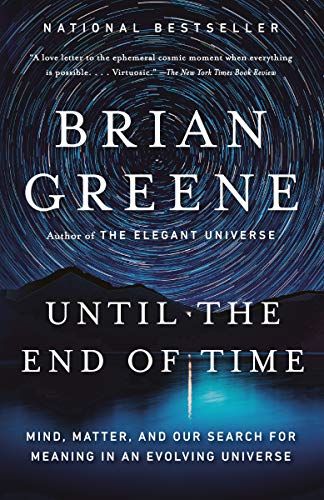8 Best-Selling Existence Books Millions Love
Explore best-selling Existence books recommended by Paul Blanchard, media strategist and author, and Yannik Schrade, CEO & Co-Founder at Arcium, offering deep insights into existence and philosophy.


There's something special about books that both critics and crowds love, especially in the realm of Existence where profound questions meet lived experience. Millions have turned to these works, finding frameworks that not only challenge but also clarify what it means to be. The popularity of these titles reflects a broad validation of their approaches, giving you access to ideas vetted by a wide spectrum of readers.
Paul Blanchard, a media strategist and author, praised Brian Greene's "Until the End of Time" for its extraordinary blend of scientific and philosophical inquiry, sharing how it reshaped his perspective on our place in the cosmos. Meanwhile, Yannik Schrade, CEO and co-founder at Arcium, found Nietzsche’s "Thus Spake Zarathustra" to be a compelling confrontation with existential questions, underpinning his own explorations of meaning and power.
While these popular books provide proven frameworks, readers seeking content tailored to their specific Existence needs might consider creating a personalized Existence book that combines these validated approaches with your unique background and goals.
by Jean-Paul Sartre, Carol Macomber, Arlette Elkaïm-Sartre, Annie Cohen-Solal··You?
by Jean-Paul Sartre, Carol Macomber, Arlette Elkaïm-Sartre, Annie Cohen-Solal··You?
Jean-Paul Sartre, a towering figure in 20th-century philosophy and literature, crafted this work to clarify and defend his existentialist philosophy against widespread misunderstandings. You’ll explore how Sartre places freedom at the heart of human existence, emphasizing that your choices define your essence and carry responsibility not just for yourself but for humanity as a whole. The book offers a concise yet profound examination of existentialist ideas through Sartre’s 1945 lecture and his reflections on Camus’s The Stranger. If you’re keen to engage deeply with questions of freedom, responsibility, and human nature, this text provides direct access to foundational existentialist thought without unnecessary complexity.
Recommended by Yannik Schrade
CEO & Co-Founder at Arcium
by Friedrich Wilhelm Nietzsche··You?
by Friedrich Wilhelm Nietzsche··You?
What if everything you knew about existence was wrong? Friedrich Wilhelm Nietzsche, a towering figure in modern philosophy, challenges conventional beliefs with his provocative declaration that "God is dead!" This book explores the will to power and the concept of eternal return, inviting you to grapple with ideas that question morality, meaning, and self-overcoming. You’ll encounter sharp aphorisms and poetic passages that push you to reconsider the foundations of your worldview. Those intrigued by deep philosophical inquiry or seeking to confront existential questions head-on will find this text both stimulating and demanding.
by TailoredRead AI·
This tailored book explores battle-tested approaches to understanding and living existential philosophy, combining ideas that millions of readers have found valuable with your unique interests. It examines how existential questions shape human experience and reveals ways to navigate existence effectively. By focusing on your background and goals, this personalized book offers a customized exploration of core existential themes, such as freedom, authenticity, and meaning, while highlighting practical reflections to deepen your insight. The content matches your specific interests to help you engage with the philosophy in a way that resonates personally and intellectually, making profound concepts accessible and relevant to your life.
by Karl Jaspers, Richard F. Grabau·You?
by Karl Jaspers, Richard F. Grabau·You?
Karl Jaspers's Philosophy of Existence challenges the common narrative that existentialism is inherently pessimistic or irrational. Drawing from his experience as a philosopher dismissed under Nazi rule, Jaspers offers a nuanced view of existentialism as a legitimate strand within Western philosophy, demonstrated through his own reflective lectures. You’ll gain insight into how existential thought intersects with cultural and intellectual currents, and how philosophy can remain rigorous and engaged rather than slipping into anti-scientific or journalistic territory. This book suits those wanting to understand existentialism beyond clichés, especially students of philosophy or anyone curious about the intellectual roots shaping modern thought.
by Dennis Bonnette·You?
What if everything you knew about classical proofs for God's existence was reconsidered? Dennis Bonnette, a scholar deeply versed in Thomistic philosophy, explores the principle "The per accidens necessarily implies the per se" within St. Thomas Aquinas' framework. You’ll gain a nuanced understanding of how this principle addresses the problem of infinite regress, a core challenge in metaphysical arguments. The book divides its investigation between broader philosophical domains and the critical relationship between creatures and God, drawing on both historical and contemporary commentators. This work suits those ready to engage with detailed philosophical analysis rather than casual overviews.
by Robert G. Olson·You?
by Robert G. Olson·You?
What started as an academic challenge for Robert G. Olson to clarify existentialism’s complexities became a clear-eyed guide for serious readers seeking depth without prior philosophy training. Olson navigates key themes like despair, freedom, and authenticity with a focus on original thinkers such as Sartre and Heidegger, while framing debates through historical and critical perspectives. You’ll gain a nuanced understanding of existentialist arguments alongside their critics, making this a solid foundation for anyone wanting more than surface-level impressions. This book suits those ready to engage rigorously with existential questions rather than casual readers.
by TailoredRead AI·
This tailored book explores a personalized, step-by-step plan for rapid existential discovery, blending widely respected insights with your unique interests and background. It examines fundamental questions about life's meaning, freedom, and purpose, guiding you through reflective exercises and tailored explorations that resonate with your personal journey. By combining knowledge that has engaged millions with a focus on what matters most to you, this book reveals pathways to deeper self-understanding and authentic existence. Its personalized approach ensures that the content matches your goals and skill level, making complex philosophical themes accessible and relevant, while encouraging meaningful, actionable reflection.
Recommended by Paul Blanchard
Media consigliere and author
“Wow. Absolutely blown away by Brian Greene’s new book. A must-read” (from X)
by Brian Greene··You?
Brian Greene, a Columbia University professor known for his work in superstring theory, offers a sweeping narrative that connects the cosmos' origins to our human search for meaning. You’ll explore how the universe's physical laws gave rise to life, consciousness, and culture, with chapters examining everything from particle physics to mythology. This book suits anyone intrigued by how scientific discovery intersects with philosophical questions about existence and purpose. It’s not a quick read but rewards you with a profound perspective on our fleeting place in an evolving universe.
by John Macquarrie·You?
by John Macquarrie·You?
John Macquarrie's "Existentialism: An Introduction, Guide and Assessment" breaks from typical philosophy texts by offering a clear-eyed exploration of existentialist thought grounded in his background as a theologian and philosopher. You’ll gain a solid grasp of key existentialist themes such as freedom, authenticity, and alienation, with Macquarrie guiding you through both historical context and critical assessment. Chapters dissect major figures like Sartre and Kierkegaard, helping you understand their differing perspectives and how they grapple with existence itself. This book suits anyone eager to move beyond surface-level introductions and engage deeply with existentialism’s challenges and insights.
by Walter Kaufmann·You?
by Walter Kaufmann·You?
Drawing from decades of philosophical scholarship, Walter Kaufmann offers a deep dive into existentialism's core through the voices of Dostoyevsky, Nietzsche, Kierkegaard, and Sartre. You gain a thorough understanding of how existential thought evolved, especially through the lens of literature and philosophy, exploring themes like freedom, despair, and authenticity. Kaufmann’s examination isn’t just academic; it invites you to grapple with the human condition and the search for meaning amid uncertainty. This book suits anyone ready to engage seriously with existential questions, whether a philosophy student or a curious thinker seeking to understand the movement’s profound impact.
Proven Existence Methods, Personalized ✨
Get expert-endorsed Existence insights tailored to your unique journey and goals.
Validated by experts and thousands of Existence enthusiasts
Conclusion
Across these eight books, a few themes clearly emerge: the quest for freedom, the confrontation with meaninglessness, and the rigorous pursuit of understanding existence through both philosophy and science. These works offer you proven frameworks that have stood the test of time and critical scrutiny.
If you prefer proven methods grounded in classic existential thought, start with Sartre’s "Existentialism Is a Humanism" or Kaufmann’s "Existentialism from Dostoyevsky to Sartre." For validated philosophical approaches that blend metaphysical rigor with cultural critique, consider Jaspers’s "Philosophy of Existence" alongside Aquinas’s detailed proofs.
Alternatively, you can create a personalized Existence book to combine proven methods with your unique needs. These widely-adopted approaches have helped many readers succeed in navigating the profound questions of existence.
Frequently Asked Questions
I'm overwhelmed by choice – which book should I start with?
Start with "Existentialism Is a Humanism" for a clear, foundational understanding of existentialism’s core ideas. It’s accessible yet profound, helping you build a solid framework before exploring more complex texts.
Are these books too advanced for someone new to Existence?
Not at all. Books like "An Introduction to Existentialism" and Sartre’s work offer approachable entry points. They balance depth with clarity, making them great for beginners eager to engage seriously.
What's the best order to read these books?
Begin with Sartre or Olson’s introductions, then explore Nietzsche and Kaufmann for literary and philosophical depth. Follow with Jaspers and Aquinas for metaphysical perspectives, and finish with Greene’s cosmic inquiry for a broader view.
Should I start with the newest book or a classic?
Classic texts like Sartre’s and Nietzsche’s provide essential foundations, while newer works like Greene’s add contemporary insights. Combining both offers a rich, well-rounded understanding of existence.
Do I really need to read all of these, or can I just pick one?
You can start with one that aligns with your interests—philosophy, theology, or science. Each book stands alone, but reading several broadens your perspective on existence’s many facets.
How can I get content tailored to my specific Existence interests?
While these expert books are invaluable, personalized content can complement them by focusing on your unique goals and background. Consider creating a personalized Existence book to blend proven methods with what matters most to you.
📚 Love this book list?
Help fellow book lovers discover great books, share this curated list with others!
Related Articles You May Like
Explore more curated book recommendations







